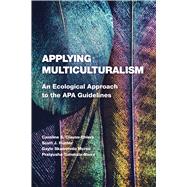This book expands on APA’s 2017 Multicultural Guidelines by exploring additional research and providing students and professionals with practical applications for clinical practice, teaching and training, research, and consultation.
As codevelopers of the guidelines, the authors provide their unique expertise in multicultural psychology, explaining how to develop cultural responsiveness and humility and become attuned to the diversity of human needs and experiences. They also describe how to create constructive dialogues about social identity and build fruitful bidirectional relationships with clients, students, and organizations, among others.
This book takes an intersectional and ecological approach that considers a variety of cultural factors at multiple levels, ranging from small to large groups, to societal and cultural forces, and to historical changes. Within this layered ecological model, each of the ten guidelines is explored in depth in its own chapter, including illustrative case examples and discussion questions. The book concludes with a comprehensive review that ties the ten multicultural guidelines together and highlights key takeaways, as well as providing future considerations for how multicultural psychology will evolve.








